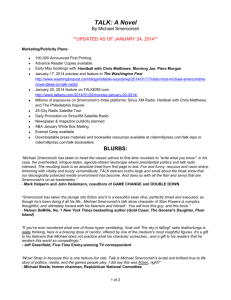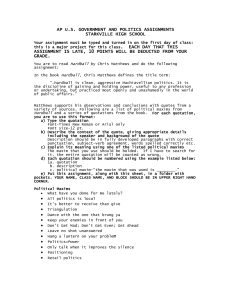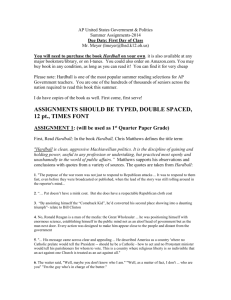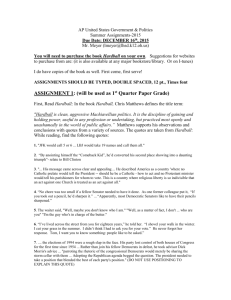AP Government and Politics
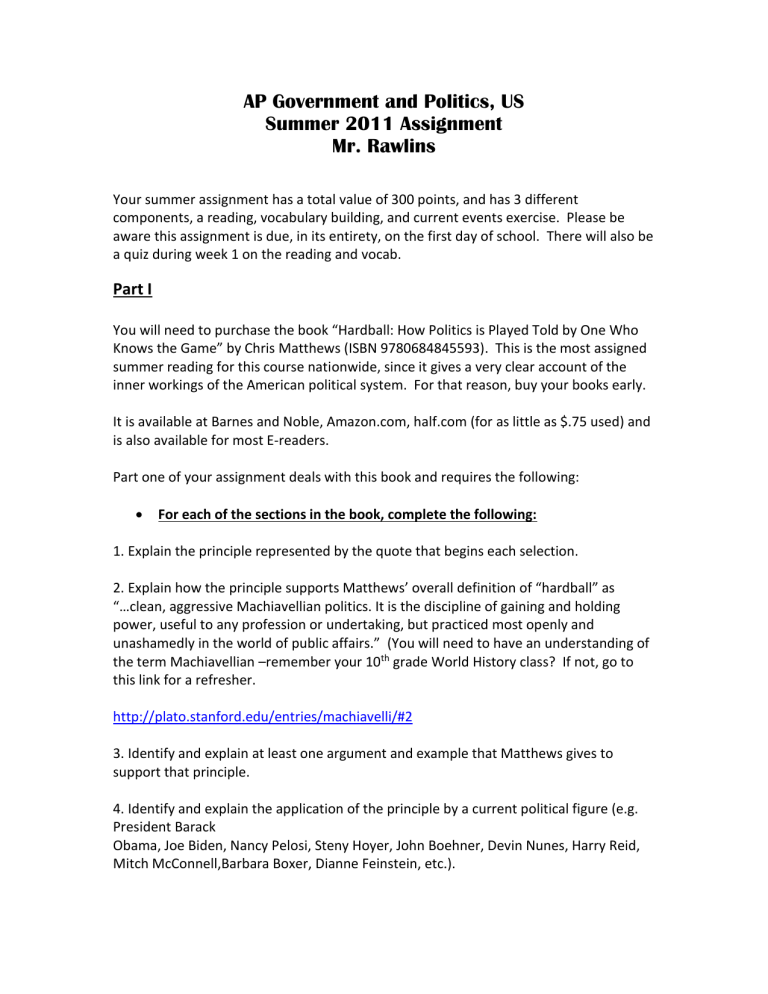
AP Government and Politics, US
Summer 2011 Assignment
Mr. Rawlins
Your summer assignment has a total value of 300 points, and has 3 different components, a reading, vocabulary building, and current events exercise. Please be aware this assignment is due, in its entirety, on the first day of school. There will also be a quiz during week 1 on the reading and vocab.
Part I
You will need to purchase the book “Hardball: How Politics is Played Told by One Who
Knows the Game” by Chris Matthews (ISBN 9780684845593). This is the most assigned summer reading for this course nationwide, since it gives a very clear account of the inner workings of the American political system. For that reason, buy your books early.
It is available at Barnes and Noble, Amazon.com, half.com (for as little as $.75 used) and is also available for most E-readers.
Part one of your assignment deals with this book and requires the following:
For each of the sections in the book, complete the following:
1. Explain the principle represented by the quote that begins each selection.
2. Explain how the principle supports Matthews’ overall definition of “hardball” as
“…clean, aggressive Machiavellian politics. It is the discipline of gaining and holding power, useful to any profession or undertaking, but practiced most openly and unashamedly in the world of public affairs.” (You will need to have an understanding of the term Machiavellian –remember your 10 th grade World History class? If not, go to this link for a refresher. http://plato.stanford.edu/entries/machiavelli/#2
3. Identify and explain at least one argument and example that Matthews gives to support that principle.
4. Identify and explain the application of the principle by a current political figure (e.g.
President Barack
Obama, Joe Biden, Nancy Pelosi, Steny Hoyer, John Boehner, Devin Nunes, Harry Reid,
Mitch McConnell,Barbara Boxer, Dianne Feinstein, etc.).
Assignments must be completed and turned in the first day of class in August. There will an assessment in the first week of school and you will be applying the concepts learned in this book throughout the year.
Your section reports are valued at 40points per section.
BOOK SECTIONS
Part I: Alliances
Pages 23-46 “It’s Not Who You Know; It’s Who You Get to Know.”
Pages 47-61 “All Politics is Local.”
Pages 62-75 “It’s Better to Receive Than to Give.”
Pages 76-88“Dance with the One That Brung Ya.”
Part II: Enemies
Pages 91-104 “Keep Your Enemies in Front of You.”
Pages 105-115 “Don’t Get Mad: Don’t Get Even; Get Ahead.”
Pages 116-130 “Leave No Shot Unanswered.”
Part III: Deals
Pages 133-144 “Only Talk When It Improves the Silence.”
Pages 145-152 “Always Concede on Principle.”
Part IV: Reputations
Pages 155-167 “Hang a Lantern on Your Problem.”
Pages 168-180 “Spin!”
Pages 181-19 “The Press is Your Enemy.”
Pages 192-208 “The Reputation of Power.”
Pages 209-221 “Positioning.”
Part II Vocabulary
Understanding and applying vocabulary is essential to success in this AP course. This is by no means a comprehensive list
Define each of the vocabulary words. Don’t just write down Mr. Webster’s definition.
Understand the term in its political context, and use your own words to explain it.
Consider this: if I were to give you an open-notebook test on these terms, would you feel comfortable with your answers? (Definitions are worth 60 points)
Americans with Disabilities Act
Amicus Curiae brief
Appellate courts
Bill of attainder
Blanket primary
Block grants
Brown v. Board of Education
Budget and Impoundment Control Act
Caucus (as per elections)
Cloture
Congressional Budget Office
Contract with America
De facto segregation
De jure segregation
Deficit
Ex post facto
Exclusionary rule
Executive order
Federalism
Filibuster
Franking privileges
Gatekeeper role
Gender gap
Great Society
House Ways and Means Committee
Interest groups
Interstate Commerce Clause
Issue ads and Citizens United v FEC
Judicial activism
Judicial restraint
Line item veto
Logrolling
Mandates
McCain-Feingold Act
Medicaid
Medicare
Motor Voter Act
Pentagon Papers
Necessary and proper clause
New Deal Coalition
Office of Management and Budget
Oversight
Patronage
Plurality
Pocket veto
Pork barrel
Realignment
Revenue sharing
Rule of propinquity
Selective incorporation
Soft money
Split ticket voting
Stare decisis
War Powers Act
Part III (Current Events)
You are required to collect at least 8 newspaper or magazine clippings (or online prints) pertaining to United States politics. You need to keep abreast of the major events occurring in the U.S. (as a student in AP Government and as a conscientious citizen).
You need 2 articles from June, 2from July, and 2 from August. For each article, include a short summary and your views on the issue. *Note* You may have more than 10 articles.
Please limit your sources to major news sources. (CNN, FOX, Poliitico, New York Times,
Washington Post, etc) ( Worth 10 Points per article)
